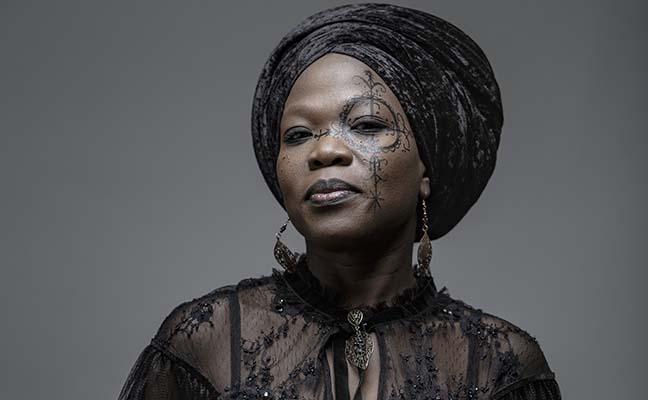We’ve booked a superb French-Haitian artist to play on our Saturday Glade mainstage bill called Moonlight Benjamin.
Brought up strictly and colonially Christian, Moonlight Benjamin has, in later life, dug back into the roots of her Haitian heritage, tapping back into the folk spirituality of her country of birth. Today, her music is often described as “Voodoo blues rock”.
We’ve booked her because she’s a wonderful artist and live performer making compelling and authentic music. She has been described as a “Caribbean Patti Smith”. She has an incredible voice and she’s bringing to life her cultural and religious heritage in irresistible form.
Moonlight Benjamin professes to be a “Voodoo Priestess”. It’s the way she identifies and sees herself. Voodoo is not a religion, but a spiritual pathway, a folk culture of animism. Coming to the Caribbean and the southern USA from West Africa with the slaves who were so perniciously traded across the Atlantic, it provided a means of a community maintaining its story and identity in the face of the oppressor (from the colonial enslaver to the sexual exploitation of disaster victims).
Of course, Voodoo has later become known in popular culture as a by-word for magic, horror and superstition. But in practice, it is a lot more natural and everyday than that. It’s about the stories and the oral tradition of a people maintaining their identity in the face of Empire. Yes, in its most extreme and fundamental forms it can hold people in another form of slavery – that of fear. But this is the exception to the rule. And in many respects, this is no different from the damage that the unfettered and fundamentalist forms of any religious system can wreak.
Voodoo has danced cheek-by-cheek with the colonial Catholicism of the Caribbean and Latin America and in Haiti, the two belief systems were inextricably intertwined for a long, long period of time, before the Catholic church took an oppositional view and mounted a campaign against Voodoo in the early parts of the twentieth century.
Interestingly, in more recent times, the Catholic church in Haiti has adopted a much more liberal and understanding view of Voodoo, even seeking to include some elements of Voodoo practice into its own religious rites as it looks to integrate its imposed worldview with the folk traditions of the indigenous population. As such, this dance is just another instance of the ways in which a colonial Christianity is seeking fruitful and meaningful dialogue with the pre-existing religious folklore of the people in any country.
Moonlight Benjamin strongly identifies with the culture of the Haitian people and sees the indigenous faith of her islanders as a unifying factor that has enabled them to rise up against injustice and to face the disasters and difficulties with a sense of hope.
Not only is Moonlight Benjamin a superb artist in her own right, her presence at Greenbelt provides us with the opportunity to shine a light on the exploitation, injustices and inequalities from which the people of Haiti have suffered as well as pointing to some excellent work (not least by our partner Christian Aid) in working with the Haitian people to build a better future.
In terms of how Moonlight Benjamin sees voodoo, this is what it says in her press pack (translated from the French):
“At the beginning of everything, there is rhythm. The rhythm, the first power of the world, which awakens and passes through when the roaring drums, turn the dancers. The rhythm by which men and gods communicate is the sense, the rhythm, through which spirits descend into humans, take possession of them, liberate them and protect them. In the rumble of the drums, the loas (spirits) awake, which by the dance and the rhythm overlap the men, because they are above all god’s dancers … “
Faced with the vacuum left by their wrenching from their lands of origin, slaves had to find a common language, to redefine themselves as a group again. All their rituals were fused within one and the same religion, which to this day remains for the Haitian people the most powerful factor in their unity in facing their oppression (and is probably why in Haiti there was the only successful slave revolt in the world).
Voodoo rhythms and songs are like the umbilical cord that connects the western part of the island of Haiti to the womb of its people, Africa. Before the Creole language, it is the artistic and ritual expression that became the cement of this new nation …

